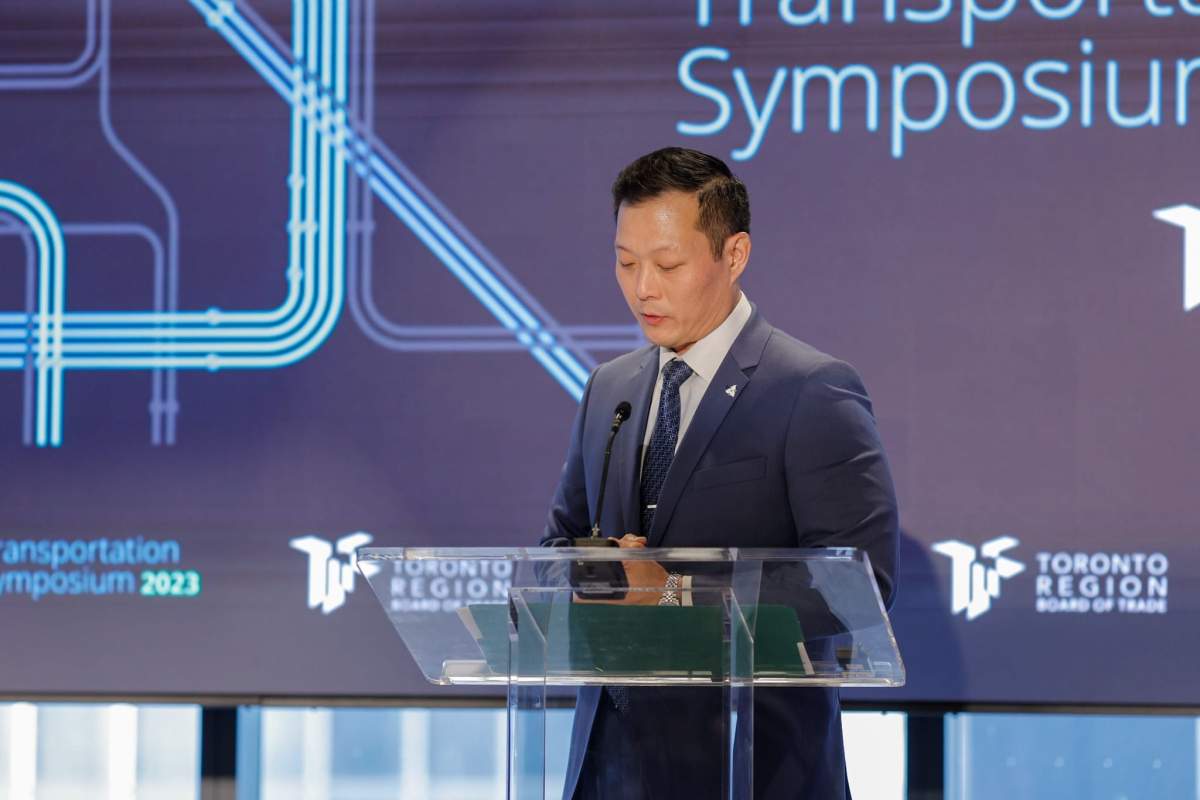The Ford government has committed to integrating transit services and fares across the Greater Toronto Area by the end of 2023.

Ontario’s associate minister of transportation Stan Cho said on Thursday afternoon that fare and service integration is “happening this year and will include Toronto.”
He said that the province is “committing to full funding” of the program, promising details will be released soon.
Speaking at an event organized by the Toronto Region Board of Trade, Cho admitted transit around Toronto is “fragmented,” telling the room that the province “cannot afford that.”
“It should be simple, it should be affordable,” he said. “But I hear very often from transit riders, they are frustrated by their current experience.”
The changes promised by Cho would dramatically reduce the cost of travel for crossing Toronto’s borders, if they are realized in full.
Under the current system, anyone switching from a Toronto Transit Commission (TTC) vehicle onto a bus in the GTA-905 or a GO train or bus is required to pay an additional fare.
The province’s fare integration promise is designed to eliminate the doubling of local transit fares, Cho told Global News.
Take a trip from Barrie to Etobicoke, for example. Under the province’s upcoming plan, the rider would still pay the standard fare for the GO Train, but the local cost of transit in Barrie to get to the GO station and Toronto to reach the final destination would be cut, with the province refunding local transit agencies for the cost.

Get breaking National news
“This is why it is such a transformational opportunity to change the way we take transit,” Cho said. “When you think about that journey — whether you’re from Mississauga to Durham or whether you’re from Barrie to Fort York, it’s long, it’s expensive and it prevents people from actually taking those transit options.”
Government documents previously reported on by Global News say these changes could affect as many as 150,000 trips of five kilometres or less across Toronto’s municipal borders every day. The failures of the current system account for missed ridership of 18 million per year, a government note says.
Extra fares cost transit riders around $38 million per year and people experience more than 300,000 hours per year waiting for connecting buses at the edge of the city, the province’s internal assessments admit.
The Ford government’s 2023 budget included a broad commitment to fare integration across much of southern Ontario. It touted a series of previously-announced fare integrations between GO Transit and local agencies in the GTA-905, without details of fare integration in Toronto.
“The government is working to expand this initiative to support more people using public transit to come into Toronto,” the budget said, though details were not forthcoming either from the minister of finance or the province’s financial blueprint.
The Toronto Region Board of Trade has led a recent push for fare integration through a series of reports, pushing for a zone system to be adopted across Toronto, the surrounding area and much of southern Ontario.
“We believe this is going to take a lot of cars off the road,” Cho told Global News.
Local transit agencies had previously argued that the cost of lost revenue from eliminating so-called double fares was a key barrier.
“Erasing the 416-905 double fare I think is an important step, but I just can’t see it being financially viable unless we get some assistance from the province,” Geoff Marinoff, who runs Mississauga’s transit system said, citing a figure of $12 to $15 million to compensate his service alone.
Speaking in February at the Toronto Region Board of Trade, Toronto Transit Commission CEO Rick Leary called fare integration “a very expensive proposition.”
The province’s promised, unveiled by Cho on Thursday, is to reimburse local agencies.
A concern raised by local transit agencies around fare integration is the need to maintain their own independence, with some fears that provincial administration of fare integration could reduce their independence to operate on their own schedules or set their own fares.
“Municipal transit agency partners remain valuable partners with their autonomy,” Cho said. “Their autonomy is maintained it is important to us to respect their decision making.”
Cho called the commitment “just a first step with more to come.”









Comments